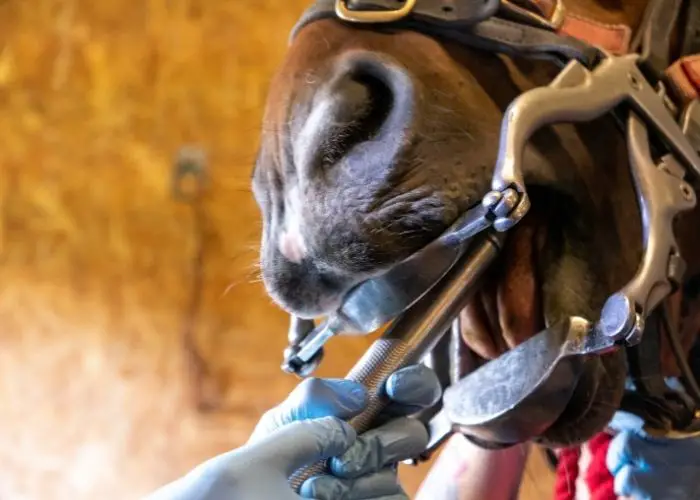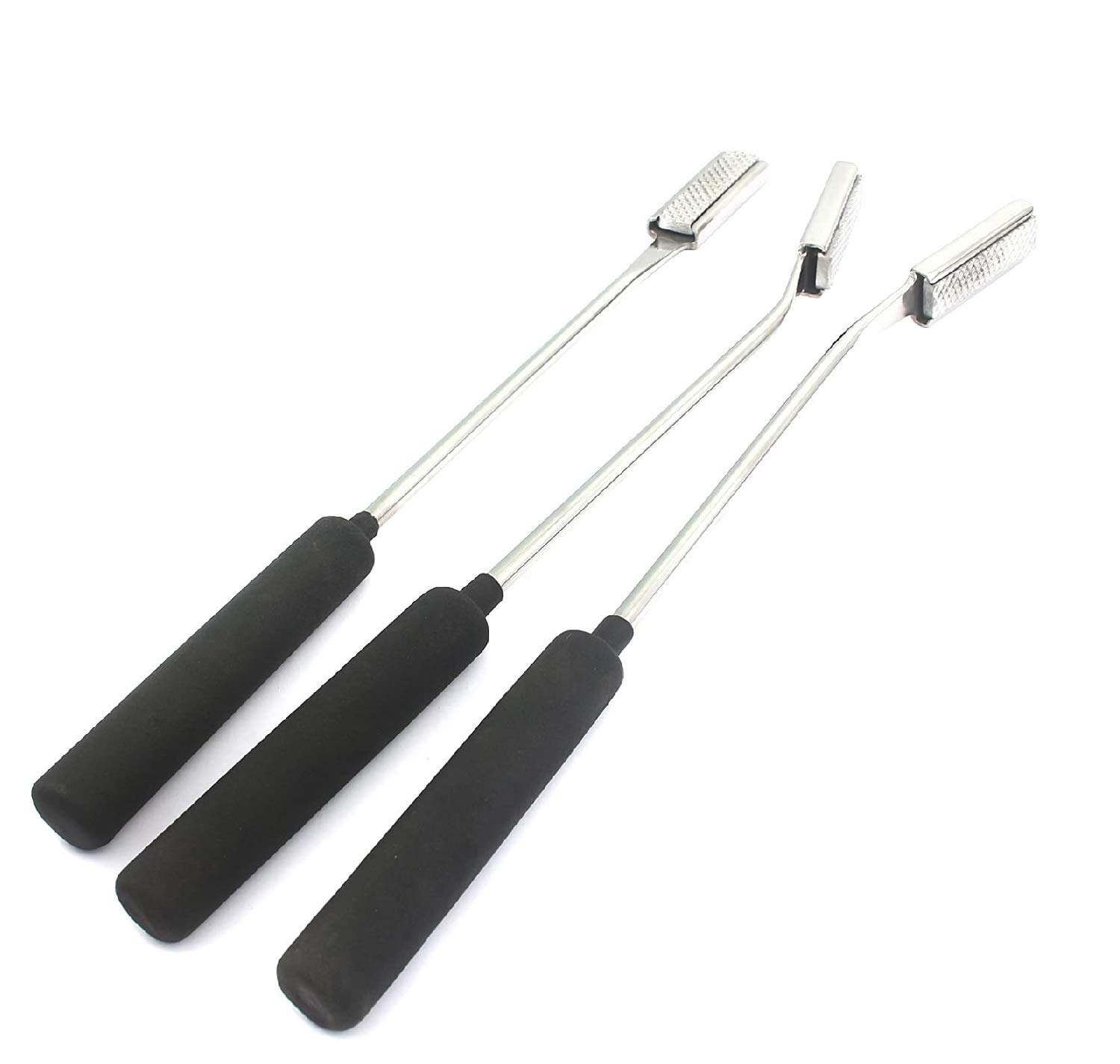Last Updated on January 21, 2022
Most horse owners will know that their equine friends need their teeth floated regularly. But have you ever wondered what happens if when horses live in the wild – how do they float their teeth?
Routine dental care is an essential part of horse maintenance and is vital to prevent problems from occurring with horses’ teeth. However, it is unlikely that wild horses pop in to see the equine dental technician, so how do they float their teeth?
Why Do Horses Need Their Teeth Floated?
The modern-day domesticated horse has a number of regular health care and maintenance needs. They must be vaccinated against a number of diseases, and receive regular farriery care. They should also be treated for worms and other parasites.
However, one of the most daunting parts of horse care is attending to their dental care needs. This can be a scary procedure for the horse, and nerve-wracking for the owner too! But there is nothing to be worried about if you are in the safe hands of a qualified equine dental professional.
All domesticated horses should have their teeth checked regularly by a dental technician. This routine examination will look for any problems with the teeth, such as overgrowths, hooks, fractured teeth, or loose teeth. If any abnormalities are found, then they may be resolved by floating the teeth.
Horses have strong, powerful teeth that continue to erupt throughout their lifespan. This is because the surface of the teeth will gradually wear away as the horse chews, and new growth will replace this.
However, as the teeth wear away and grow, they may become misshapen. This is often because the teeth are not correctly aligned when the horse chews. This means that the grinding surfaces do not meet each other, and the outer edges of the teeth are not worn away.
As horses age, they start to lose teeth, leaving gaps in the dental arcade. When this happens, the opposite tooth has nothing to grind against. This will result in a large dental overgrowth that will need regular floating.
How Are Horses Teeth Floated?
The process of floating a horse’s teeth involves using specialized tools to correct any abnormalities in the mouth. To do this the dental technician needs to be able to access the mouth safely. To do this a dental gag is used to hold the mouth open, and the horse may need to be sedated to keep it calm.
Once the dental technician can safely access the mouth, a full examination will be carried out. If nothing abnormal is found at this stage, the horse will be checked again at a later date. If some abnormalities are detected, then a treatment plan will be made.
The most common form of dental treatment is floating the horse’s teeth. Many horses will tolerate this procedure without any sedation. Younger or more nervous horses may require light sedation to have their teeth floated.
The floating technique is used to correct any overgrowth of the teeth, such as hooks and ramps. If the horse is found to have loose or fractured teeth, then more advanced treatment may be necessary.
Floating a horse’s teeth involved using rasp-like tools to file away unwanted dental growth. In the past, this was done with manual hand tools, but it is now more common to see power tools being used. The rasps are used to level out any overgrowth and file away sharp points and hooks.
If you’ve never seen this procedure before, check out out this great video of a horse getting its teeth floated:
How Often Do Horses Need Their Teeth Floating?
Every horse is unique, and how often they need their teeth floating will be different for each horse. However, one thing that is important is that dental checks are carried out on a regular basis. This will help to identify any problems early, making them easier to resolve.
In a healthy adult horse with no known dental issues, it is generally sufficient for a routine dental examination to be carried out on an annual basis. The teeth may or may not need floating every year, but they should be checked anyway. If left unchecked, a small problem can turn into a big issue that needs extensive treatment to resolve.
Some horses are at higher risk of dental problems and should have more frequent dental examinations. Your equine dental technician will be able to guide you here and may suggest a check every three or six months. At-risk horses include young and geriatric horses and those with dental abnormalities or a history of dental problems.
Read more about What Does It Mean To Float A Horses Teeth?
How Do Wild Horses Float Their Teeth?
So, if our domesticated horses need all this dental care, what happens in a feral herd? And just how do wild horses float their teeth?
The sad fact is that most of the problems with domesticated horses’ teeth are as a result of human intervention. A wild horse will graze on rough land for many hours each day, while our pet horses snack on hay in a barn.
When a horse puts its head down to graze, the teeth are properly aligned and are more likely to wear away normally. The tough grasses also help to ensure the teeth wear away evenly. This means that dental problems are much less likely to occur in wild horses than in domesticated horses.
Another problem with domesticated horses is how we breed them. A horse will be selected for breeding even if it has poor teeth, but in the wild, this horse would not live a long life and is unlikely to breed successfully. Sadly, this means we are breeding more and more horses with dental problems!
Summary
So, as we have learned, horses in the wild float their teeth naturally by chewing on tough grass all day long. Domesticated horses need regular teeth floating to prevent dental problems such as overgrowths and sharp teeth.
We’d love to hear your thoughts – does your pony love having his teeth floated? Or do you both dread the annual visit from the dental technician? Leave a comment below and we’ll get back to you!
Learn more about How Much Does Horse Teeth Floating Cost? Learn To Care for Your Horses Teeth

Kate Chalmers is a qualified veterinary nurse who has specialized in horse care for the vast majority of her career. She has been around horses since she was a child, starting out riding ponies and helping out at the local stables before going on to college to study Horse Care & Management. She has backed and trained many horses during her lifetime and competed in various equestrian sports at different levels.
After Kate qualified as a veterinary nurse, she provided nursing care to the patients of a large equine veterinary hospital for many years. She then went on to teach horse care and veterinary nursing at one of the top colleges in the country. This has led to an in-depth knowledge of the care needs of horses and their various medical ailments, as well as a life-long passion for educating horse owners on how to provide the best possible care for their four-legged friends.
Kate Chalmers BSc (Hons) CVN, Dip AVN (Equine) Dip HE CVN EVN VN A1 PGCE


